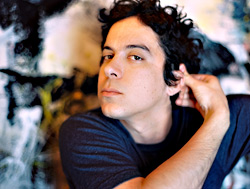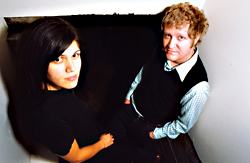“You may not be interested in war,” Bolshevik revolutionary Leon Trotsky suggested. “But war is interested in you.”
To judge from his fifth and finest disc, Post-War, the armed struggles of the world—both figurative and literal—have indeed located Portland-based singer/songwriter Matt “M.” Ward.
“When it comes to songwriting, I’m living in this naive fantasia where people actually care about the well-being of others,” Ward says by phone from his London hotel (minutes before sound check for his gig at, ironically, Bush Hall). “That’s a direct contradiction to everything I’ve been reading in the newspapers for the last few years. Hopefully, what I’m saying has the ring of truth to it . . . represents both the light and the dark. I like the idea of creating these characters that are in love with peace, but living in the shadow of catastrophe.”
Post-War is populated with just such personae, a cast of tormented souls torn straight from the pages of Hugo or Hemingway (whose semiautobiographical The Sun Also Rises provided a key source of inspiration for the album). From the ne’er-do-well little brother stalking the world with a gun in his hand (“Right in the Head”) to the dearly departed friend whose “heart was stronger than a heavy metal bullet” (“Requiem”) and the cruel girlfriend whose most enduring feature is her “one magic trick/she disappears” (“Magic Trick”), Ward’s creations bravely attempt to maintain their humanity while soldiering through a world that is largely indifferent to their pain and suffering. But while Ward clearly knows from misery, he’s no sad sack—rather than surrendering to maudlin postures or trendy knee-jerk pacifism, he assumes a steely-eyed stoicism, rendering his stories in a perfectly imperfect, gravel-paved growl that belies his youngish 32 years.
Ward then filters his tales through a musical lens that has more in common with the country bluesmen of more than half a century ago—think Robert Johnson, Leadbelly, or Woody Guthrie—than anything remotely contemporary. Not that this makes Ward’s music retro; if anything, Post-War is his boldest, most modern-sounding production to date, employing two drummers, a variety of production techniques (including his first use of strings and a wall-of-sound density courtesy of Mike Mogis, the Omaha-based producer), and enough space to allow Ward’s accomplished guitar work room to breathe. The net effect is quietly electrifying—Ward’s masterpiece in a canon already filled with solid songcraft.
“I wanted to move past Transistor Radio,” Ward explains by way of comparing Post-War to his 2005 effort. “The last record was very backward-looking, and I wanted to make a record that, thematically and sonically, was much more focused on what’s ahead. Every record—every song—should be an experiment. If there are no surprises in the control room, my job starts to get boring.”
Ward’s project—described in a recent Vanity Fair feature as the musical answer to the question, “How will America heal once the craziness in Iraq is over?”—sprang to life two years ago in the attic recording studio of fellow Portlander and longtime musical partner Mike Coykendall (Old Joe Clarks), whose drumming, bass, and voice are splashed across Ward’s last three records. As on his previous work, Ward is joined by a rotating cast of like-minded conspirators—alt-country chanteuse Neko Case and My Morning Jacket frontman Jim James both make appearances—as well as two key members of his touring band, Jordan Hudson and ex–Decemberists drummer Rachel Blumberg. This creative continuity allowed Ward to take his time assembling the puzzle pieces of the album, which evolved slowly at first and then culminated in a flurry of recording this spring, when Daniel Johnston’s “To Go Home” was added and the finish line came into view.
Post-War‘s Johnston cover is the latest in a series of musical archaeological “digs” for Ward, an ongoing game of pin-the-tail-on-the-troubadour in which he dons his songfinder hat, drastically re-arranges his track of choice, and then interprets it in a signature front-porch Americana-ese (past records have included unique spins on the Beach Boys’ “You Believe in Me,” David Bowie’s “Let’s Dance,” and Pete Townshend’s “Let My Love Open the Door”). “It’s pure gold. It just takes a little digging,” says Ward of his Johnston cover. “That’s the way I learned guitar— by playing other people’s songs. It’s the most exciting part of my musical education, because it propels whatever you’re doing into new directions and shows you the potential of a naive musical idea.”
Johnston’s tune slots snugly into an album notable for its economy, artistry, and humanity. When Ward croons, “In war he was like a tiger/When it was over, like a dove”—as he does so mournfully on “Requiem”—you can hear him balancing the light and the dark impulses that govern our lives, reconciling the mayhem humans unleash on one another with the value of our earthly existence.
“I like that this record can live in that space,” Ward finishes. “Every album should open the door for whoever’s listening to it to enable their own interpretation.”








